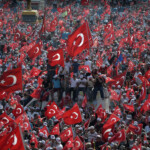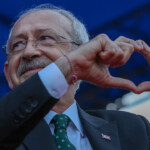“Like the French walled city of Carcassonne when besieged, which threw food over the walls to show it could hold out, Turkey’s Central Bank is exhausting its last reserves to hold the dollar around 19 lira before the elections.”
As far as Turkey is concerned, the party is over. And whoever continues as head of government will face a reckoning.
An unlikely soothsayer is American economist Jesse Colombo, who in 2014 warned that Turkey’s bubble economy, predicated on a combination of foreign ‘hot money’ inflows and ultra-low interest rates, was heading for a bust.
A government-driven infrastructure boom led not only to new roads, bridges, high-speed trains, airports, hospitals and schools but also residential buildings, skyscrapers, malls and hotels.
In what has been dubbed ‘crony capitalism’ five companies in particular, Limak, Cengiz, Kolin, Kalyon and MNG, “the gang of five”, are the leading beneficiaries of public tenders. Another Turkish construction company, Rönesans Holding, which built President Erdoǧan’s palace in Ankara, ranks among the world’s largest.
Five years ago, former Central Bank governor, Durmuş Yılmaz, who is now a deputy for the opposition İyi (‘Good’) Party, blasted Erdoǧan’s handling of the economy, which for most of the 2000s was one of the world’s fastest growing.
In his view, Turkey could have fostered innovation, improved productivity, increased competitiveness and invested in high-value-added and knowledge-based enterprises. Instead, cheap credit went to government giveaways, crony contracts, pork barrel projects, and conspicuous consumption. Then the global financial crisis struck and cheap credit started to dry up.
According to one analysis, the Turkish lira has shed 76% of its value during Erdoǧan’s second term as president, which began in 2018. This has been marked by several currency crises due to unorthodox policies, geopolitical developments such as the Ukraine war and disputes between Ankara and Washington.
President Erdoǧan considers interest rates “the mother and father of all evil” and blamed the Gezi Park protests in 2013 on “the interest rate lobby”. Consequently, in defiance of conventional economic theory he has insisted that central bank governors reduce rather than increase the benchmark rate to combat inflation. A reluctance to do so has cost three governors their job since 2019, until a more pliable candidate was found in 2021.
In 2018 the benchmark rate was raised to 24 percent to defend the lira but has subsequently been reduced to 8.5 percent. At a meeting of the Central Bank last month it was decided not to reduce the rate further in the face of raging inflation and the collapse of the lira.
Yet at a meeting with TÜSIAD (Turkish Industry and Business Association) in December 2021, Erdoǧan made it plain as a Muslim he would continue to lower interest rates in accordance with Islamic teaching.
The central issue that is facing Turks at the elections on Sunday is the rampant inflation, which according to the latest statistics from the Central Bank fell to 43.68 percent in April. However, according to ENAGroup, an independent inflation research group, the actual figure is 105.19 percent.
Last year, the Turkish government considered sending independent economic researchers to prison if they published data without official approval. However, in March in a draft election manifesto the AKP signalled a return to more orthodox, free market policies.
Last month President Erdoǧan inaugurated the Istanbul Finance Center (IFC), a long-planned prestige project designed to rival not only the old financial centers in London, New York and Frankfurt but also the new in Dubai, Singapore and Hong Kong.
This is intended to be an exponent of the Turkish economic model, which is in a sorry state. The Turkish lira has only been kept from collapse by swap deals with, for example, Qatar, China, South Korea and the Emirates, but also backdoor interventions.
From 2019 to 2020 an estimated $128 billion was used to prop up the lira and according to Selva Baziki, a former director of the Central Bank’s Macro Financial Analysis, since December 2021 until March this year another $128 billion has been spent.
The Central Bank has also resorted to selling gold to supplement its dwindling foreign exchange reserves. At the same time, Turkey’s burgeoning current account deficit has been reduced by unaccountable capital inflows registered as “net errors and omissions”.
A fortnight ago President Erdoǧan stressed that Sunday’s elections would be a critical choice for the nation to decide whether to maintain trust and stability or revert to the “era of coalitions”. As Environment, Urbanization and Climate Change Minister Murat Kurum also emphasized at an IFC news conference, investors want trust and stability. But this has evaporated.
The Financial Times has in a swingeing analysis warned it will be “grotesquely difficult” to rebuild Turkey’s economy and regain credibility among foreign investors, irrespective of who wins on Sunday. For example, less than 1 percent of Turkey’s domestic government debt is owned by foreigners, down from around a quarter a decade ago.
Like the French walled city of Carcassonne when besieged, which threw food over the walls to show it could hold out, Turkey’s Central Bank is exhausting its last reserves to hold the dollar around 19 lira before the elections. But according to JPMorgan it could drop to as low as 30 afterwards with a bond yield of 25 percent.
As the Financial Times concludes, whatever happens, it’s going to be a tough period for Turkey.


